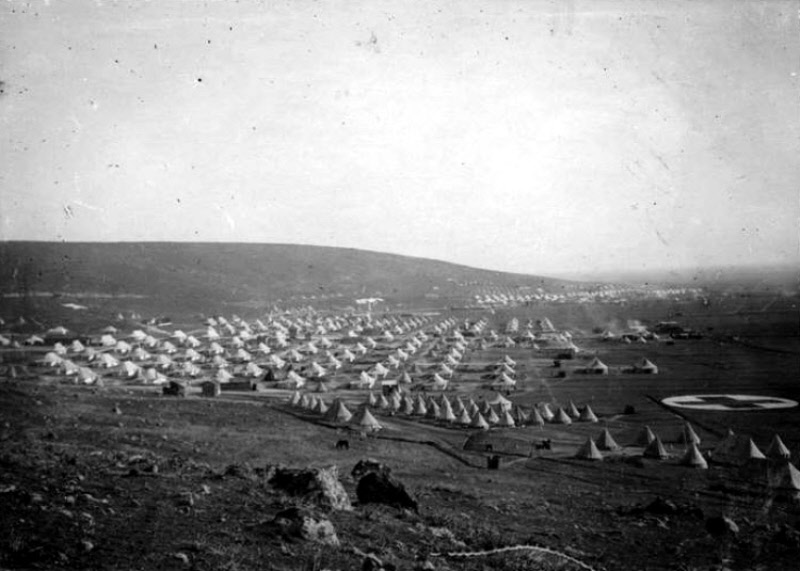
Lawrence David Richard Wilson was born in Ossett on the 26th July 1892 and baptised at All Saints Church, Wakefield on the 2nd April 1905. His mother was Elizabeth Wilson and their address was the (Church of England Waifs and Strays Society’s) Bede Home, Wakefield. No father’s name was given on the baptism record.
In 1901, Elizabeth was 41 years-old and a widow, born in Doncaster, and living in Barnsley, working as a tailoress. She was living with her 12 year-old daughter, Martha, and 9 year old-son, Lawrence, who were both scholars at public school. The Census records Ossett as the birthplace of both children. By 1911 Lawrence, aged 19, was living with his cousin’s family at Back Lane, Crigglestone, where he was working as a scale picker at the local colliery.
On the 1st April 1916, at St Philip’s Parish Church, Girlington, Bradford, Lawrence married Amy Palmer. Lawrence was working as a woolcomber and his father’s name was given as Fred Wilson, a Boarding House keeper. The 1916 marriage registration did not report that Lawrence’s father Fred was deceased, but in 1901, Lawrence’s mother, Elizabeth, claimed to be a widow. Both Lawrence and Amy were living in Bradford at the time of their marriage. In summer 1916, in Bradford, a child, Vera Wilson was born to a mother whose probable maiden name was Palmer.
Lawrence Wilson’s army service record has not survived, but it is known that he enlisted at Bradford and joined the Royal Army Medical Corps with regimental service number 115926. Private Lawrence Wilson died in Salonika on the 25th November 1917 from malaria and was posthumously awarded the British and Victory medals, but not the 1914/15 Star indicating that he did not serve overseas before the 31st December 1915.
Anglo-French forces began landing at the Greek port of Salonika (now Thessaloniki) on the 5th October 1915. The troops were sent to provide military assistance to the Serbs who had recently been attacked by combined German, Austro-Hungarian and Bulgarian armies. The intervention came too late to save Serbia and after a brief winter campaign in severe weather conditions on the Serbian frontier, the Anglo-French forces found themselves back at Salonika.
The RAMC, 38th General Hospital was located in France during 1915, and then transferred to Salonika in June/July 1916 during the Bulgarian attack on Greece. No. 38 was one of five British hospitals attached to the Serbian army on the Salonika Front and was located at at Kapudzilar. The others were Nos. 36, 37 and 41 General and No. 33 Stationary. The Salonika front had three casualties of disease to every one casualty of enemy action. Malaria proved to be a serious drain on manpower during the campaign. In total, the British forces suffered 162,517 cases of the disease and in total 505,024 non-battle casualties.
Lawrence Wilson was not remembered on any Ossett Memorial or Roll of Honour. The evidence suggests that he and his elder sister were born in Ossett, but by 1894 Lawrence and his mother appear to have fallen on hard times and were living in Wakefield in a home for waifs and strays. He is remembered in this 2014 biography and Roll of Honour because the Commonwealth War Graves Commission and/or the U.K. Soldiers who Died in the Great War 1914-1918 listing records him as born or residing in Ossett.
After the War, Lawrence’s wife was living at 46 Ingleby Street, Brownroyd, Bradford, which was the address on their marriage registration in April 1916. There are Bradford marriages of an Amy Wilson in late 1920 (to Leonard Dutchman) and in Spring 1923 (to Horace Eady) but it is not known with certainty that this was Lawrence’s widow who re-married.

Above: Royal Army Medical Corps, 37th General Hospital at Salonika during WW1. The hospital was bombed by German aircraft on the 12th March 1917, and two nurses and four RAMC orderlies were killed, despite the hospital being clearly marked. Private Lawrence Wilson served in the 38th General Hospital in the same general area and it is likely that there were strong similarities between the two field hospitals.
Private Lawrence Wilson, aged 23 years, husband of Amy Wilson, of 46, Ingleby St., Brownroyd, Bradford, Yorkshire died on the 25th November 1917 and is buried at grave reference 155. at the Mikra British Cemetery, Kalamaria, 1 Greece. Mikra British Cemetery is situated in the Municipality of Kalamaria in the city of Thessaloniki just off Konstantinou Karamanlis Street between the army camp of Ntalipi (pronounced Dalipi) and the Kalamaria Greek Communal Cemetery.
At the invitation of the Greek Prime Minister, M.Venizelos, Salonika (now Thessalonika) was occupied by three French Divisions and the 10th (Irish) Division from Gallipoli in October 1915. Other French and Commonwealth forces landed during the year and in the summer of 1916, they were joined by Russian and Italian troops. In August 1916, a Greek revolution broke out at Salonika, with the result that the Greek national army came into the war on the Allied side.
The town was the base of the British Salonika Force and it contained, from time to time, eighteen general and stationary hospitals. Three of these hospitals were Canadian, although there were no other Canadian units in the force.
The earliest Commonwealth burials took place in the local Protestant and Roman Catholic cemeteries, and the Anglo-French (now Lembet Road) Military Cemetery was used from November 1915 to October 1918. The British cemetery at Mikra was opened in April 1917, remaining in use until 1920. The cemetery was greatly enlarged after the Armistice when graves were brought in from a number of burial grounds in the area.
Mikra British Cemetery now contains 1,810 Commonwealth burials of the First World War, as well as 147 war graves of other nationalities. Within the cemetery will be found the Mikra Memorial, commemorating almost 500 nurses, officers and men of the Commonwealth forces who died when troop transports and hospital ships were lost in the Mediterranean, and who have no grave but the sea. They are commemorated here because others who went down in the same vessels were washed ashore and identified, and are now buried at Thessalonika.
References: